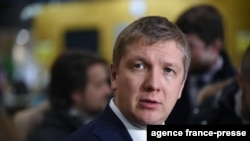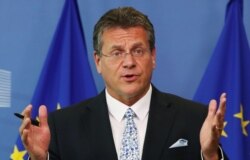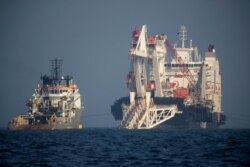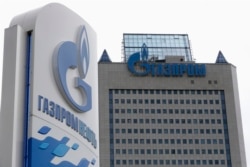The head of Ukraine's state-owned oil company says Kyiv will remain able to supply Europe with natural gas from its subterranean storage units even if European Union-mediated talks don't pan out.
“We are fully confident that Ukraine can maintain gas supply ... at least during the first quarter of 2020,” Naftogaz CEO Andriy Kobolyev said Friday at a public event in Brussels.
On Thursday, Russia and Ukraine held their third round of ministerial-level talks in Brussels about the transit of Russian natural gas to Europe, where all parties hoped to negotiate a new long-term agreement on gas flows before the current deal expires January 1.
Ukrainian energy authorities are worried Moscow could stop supplies through Ukraine when the current contract expires, possibly limiting gas deliveries to Europe in winter.
Although EU Energy Commissioner Maros Sefcovic said “a certain sense of urgency was really present in the room" throughout Thursday's talks, no formal commitments were made.
According to Sefcovic, all parties agreed that a future contract would be based on EU law, and that the unbundling of Ukraine’s Naftogaz gas transport operations should be completed, which would create a separate entity to handle the transit of gas through Ukraine.
He also said all parties agreed to resume ministerial-level talks before the end of October, and those representatives from companies involved in the contract development would continue negotiating the details of Thursday's general agreement.
On Friday, however, CEO Kobolyev said that even if talks fail, Naftogaz's 19.6 billion cubic meters of natural gas currently held in underground storage will remain in play, and that Ukraine has signed at least one deal for reverse flows from Europe.
It was also reported Friday that Naftogaz is already seeking to recover any losses from maintaining the transit network if the deadline arrives without a deal.
“We are looking for full recovery of all relevant costs, including recovery of residual value of Ukraine’s gas transmission system,” Kobolyev was quoted as saying by Reuters on Friday.
“We are not disclosing a number here. But the number is quite high.”
Nord Stream 2, TurkStream, and litigation
This week's talks follow a Sept. 10 decision by the top European Union court in Luxembourg to reimpose limits on gas flows via the Opal pipeline, a spur that connects Germany with the Nord Stream pipeline system operated by Russia's state-owned Gazprom.
Gazprom is pushing to complete the Nord Stream 2 and TurkStream pipeline projects in 2020, after which it would no longer depend upon Ukraine's pipelines for transit. Ukraine's loss of roughly $3 billion gas-transit fees — about 3% of national GDP — would be a substantial blow to the Ukrainian economy.
Naftogaz announced in July 2018 that it had submitted a claim to the Stockholm arbitration court demanding compensation of up to $14 billion for the loss of gas-transit system value if Gazprom refuses to sign a contract by the deadline.
Ukraine, however, is ready to recall this claim if Russia signs a contract agreeing to continue transporting gas through its territory after January 1.
In February 2018, the Stockholm arbitration tribunal awarded $4.63 billion in compensation to Naftogaz; Gazprom still owes Naftogaz $2.56 billion plus interest on this amount.
In recent months, however, Russian President Vladimir Putin adopted a conciliatory tone, saying Russia was ready to keep up transit via Ukraine if Naftogaz is willing to recall the legal claims.
Edward Chow, senior associate in the Energy and National Security Program at Washington's Center for Strategic and International Studies, says the Ukrainian delegation should resist forfeiting their legal wins to reach the deal.
Litigation and contract negotiations, he said, "should be kept as separate as possible" and that "whenever the final judgment comes, Gazprom should honor that judgment."
Gas wars
In 2006 and 2009, disagreements between the two nations cut natural gas supplies to Western Europe in the middle of winter, leaving many without heat.
Some analysts say an interruption in gas flows to Europe this winter "might damage the reputation of Gazprom permanently."
"Europe is already going through an examination of what role fossil fuels should play in the energy future. The gas seemed like a good bridging fuel between carbon-emitting fossil fuels and renewables," Chow said. "However, it does not have to be that way. So, if Gazprom wants to maintain market share in Europe, it should not want a supply interruption."
Margarita Assenova, an energy expert with the Washington-based Jamestown Foundation, says although Ukraine has substantial natural gas reserves, other countries would be especially vulnerable to an interruption.
"The most vulnerable countries to gas interruptions from Russia are Bulgaria, Macedonia and Bosnia-Herzegovina," she told VOA. "They don't have sufficient gas storage facilities, and they don't have alternative suppliers.
"Russia depends on sales to Europe more than Europe depends on buying Russian gas," she added, explaining that this fact gives Ukraine an upper hand in ongoing negotiations.
"Russia supplies about one-third of the gas that Europe consumes, but Russia sells 99% of its gas to Europe," she said. "So, who is going to lose more if Europe turns to other sources?"
After Thursday's talks in Brussels, the energy ministers of Russia and Ukraine, Aleksandr Novak and Oleksiy Orzhe, said both sides had agreed to meet again by the end of October.
This story originated in VOA's Ukrainian Service.







